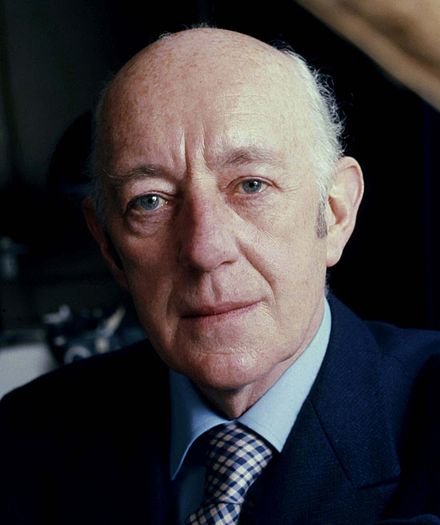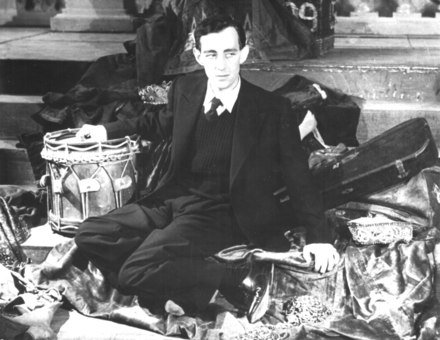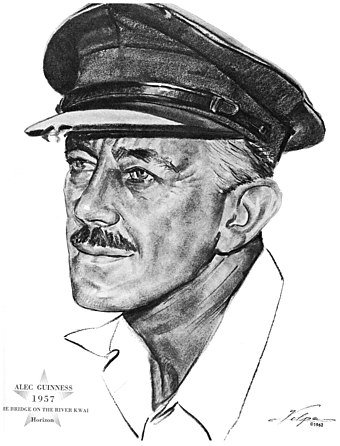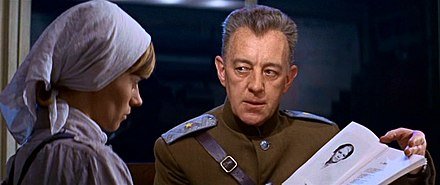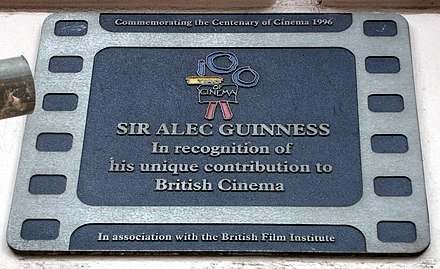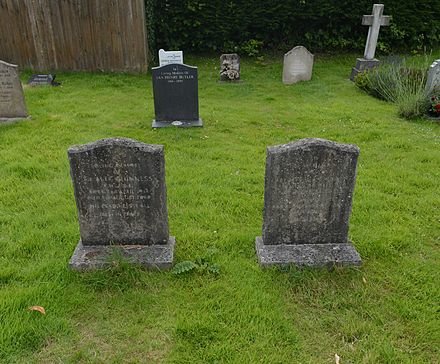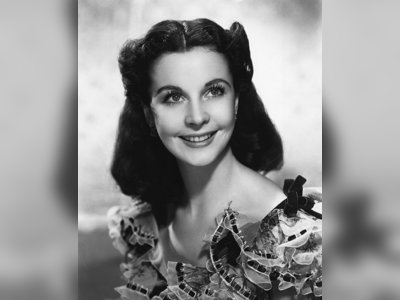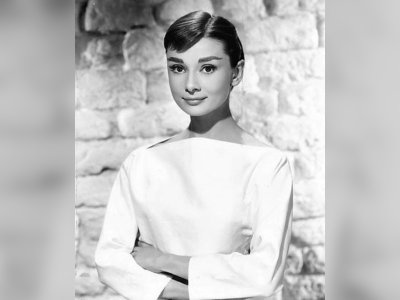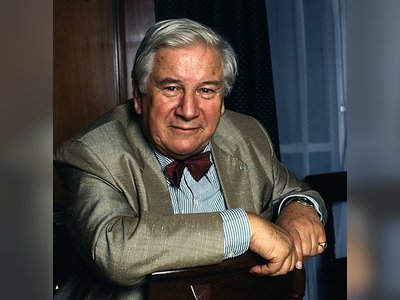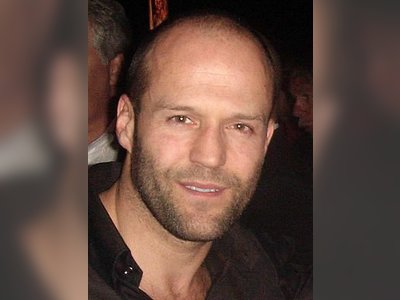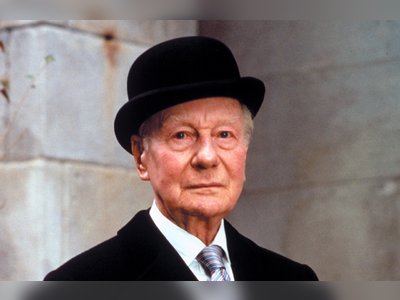British Heritage
Remember, Cherish, Learn.
beta
Alec Guinness - Knight of the Realm, Master of the Jedi
Contribution to British Heritage.
Sir Alec Guinness, one of the most versatile, prolific, and beloved English actors of his time, made significant contributions to British heritage through his exceptional talent and iconic roles on stage and screen. Renowned for his ability to portray diverse characters with depth and authenticity, Guinness left an indelible mark on British cinema and theatre, becoming one of the greatest actors alongside Laurence Olivier and John Gielgud. His performances in classic British films and Shakespearean plays, as well as his portrayal of Obi-Wan Kenobi in George Lucas's original Star Wars trilogy, have solidified his legacy in the annals of British cultural heritage.
Born on April 2, 1914, in London, Alec Guinness began his acting career in the 1930s, making his mark in various Shakespearean roles on the stage. His remarkable transition from the theatre to the silver screen after World War II showcased his extraordinary talent and versatility. Guinness became particularly associated with the renowned Ealing Comedies, captivating audiences with memorable performances in films such as "Kind Hearts and Coronets" and "The Lavender Hill Mob." These early successes laid the foundation for a brilliant career that spanned decades and earned him numerous accolades and honors.
Perhaps Guinness's most significant contribution to British heritage came through his collaboration with director David Lean. Their partnership resulted in critically acclaimed films such as "Great Expectations," "Oliver Twist," and "The Bridge on the River Kwai." The latter earned Guinness an Academy Award and a BAFTA for Best Actor, solidifying his status as a distinguished British actor on the international stage. Subsequent roles in Lean's "Lawrence of Arabia," "Doctor Zhivago," and "A Passage to India" further cemented his position as one of Britain's finest thespians.
However, it was his portrayal of the wise and noble Jedi Knight, Obi-Wan Kenobi, in George Lucas's "Star Wars" trilogy that transcended generations and endeared him to a whole new audience. Despite initially having reservations about the film's script and dismissing it as "fairy-tale rubbish," Guinness's performance as the iconic character earned him widespread recognition and reverence, making him a symbol of wisdom and mentorship in popular culture. His portrayal of Obi-Wan Kenobi remains etched in the memories of fans worldwide, ensuring his enduring legacy for years to come.
Sir Alec Guinness's contribution to British heritage extends beyond his remarkable acting career. In recognition of his significant impact on the arts, he received several prestigious honors and awards. In 1959, Queen Elizabeth II knighted Guinness for his exceptional services to the arts, bestowing upon him the title of "Sir." He also received the BAFTA Academy Fellowship Award in 1989, in appreciation of his lifetime dedication to the craft of acting.
In addition to his film and stage work, Guinness made valuable contributions to British culture through his commitment to preserving theatrical traditions. His dedication to Shakespearean plays and classical roles ensured that the rich heritage of British theatre remained vibrant and relevant to contemporary audiences.
Sir Alec Guinness's career spanned over half a century, during which he played an astonishing 77 parts in theatre productions and numerous memorable roles in films. He garnered international acclaim, winning an Academy Award, a BAFTA, a Golden Globe, and a Tony Award. Guinness's stage performances were especially noteworthy, with his portrayal of T. E. Lawrence in Ross earning him an Evening Standard Award.
Throughout his career, Guinness remained committed to his craft and brought a unique depth and sensitivity to his characters. His ability to immerse himself fully into roles and deliver performances of the highest caliber earned him the respect of his peers and the admiration of audiences worldwide. In 1980, he received an Academy Honorary Award, recognizing his outstanding lifetime achievements in the world of acting.
A man of great humility, Guinness was also known for his charitable contributions and philanthropy, often supporting causes related to the arts and education. His love for the stage and cinema drove him to inspire future generations of actors and artists, making a lasting impact on the development of British theatre and film.
On August 5, 2000, the world lost a legendary talent, as Sir Alec Guinness passed away at the age of 86. His contributions to British heritage continue to be celebrated and cherished, ensuring that his legacy as a Knight of the Realm and Master of the Jedi lives on, inspiring generations of actors and audiences alike.
Legacy
Born on April 2, 1914, in London, Alec Guinness began his acting career in the 1930s, making his mark in various Shakespearean roles on the stage. His remarkable transition from the theatre to the silver screen after World War II showcased his extraordinary talent and versatility. Guinness became particularly associated with the renowned Ealing Comedies, captivating audiences with memorable performances in films such as "Kind Hearts and Coronets" and "The Lavender Hill Mob." These early successes laid the foundation for a brilliant career that spanned decades and earned him numerous accolades and honors.
Perhaps Guinness's most significant contribution to British heritage came through his collaboration with director David Lean. Their partnership resulted in critically acclaimed films such as "Great Expectations," "Oliver Twist," and "The Bridge on the River Kwai." The latter earned Guinness an Academy Award and a BAFTA for Best Actor, solidifying his status as a distinguished British actor on the international stage. Subsequent roles in Lean's "Lawrence of Arabia," "Doctor Zhivago," and "A Passage to India" further cemented his position as one of Britain's finest thespians.
However, it was his portrayal of the wise and noble Jedi Knight, Obi-Wan Kenobi, in George Lucas's "Star Wars" trilogy that transcended generations and endeared him to a whole new audience. Despite initially having reservations about the film's script and dismissing it as "fairy-tale rubbish," Guinness's performance as the iconic character earned him widespread recognition and reverence, making him a symbol of wisdom and mentorship in popular culture. His portrayal of Obi-Wan Kenobi remains etched in the memories of fans worldwide, ensuring his enduring legacy for years to come.
Contribution to British Heritage
Sir Alec Guinness's contribution to British heritage extends beyond his remarkable acting career. In recognition of his significant impact on the arts, he received several prestigious honors and awards. In 1959, Queen Elizabeth II knighted Guinness for his exceptional services to the arts, bestowing upon him the title of "Sir." He also received the BAFTA Academy Fellowship Award in 1989, in appreciation of his lifetime dedication to the craft of acting.
In addition to his film and stage work, Guinness made valuable contributions to British culture through his commitment to preserving theatrical traditions. His dedication to Shakespearean plays and classical roles ensured that the rich heritage of British theatre remained vibrant and relevant to contemporary audiences.
Success and General Information
Sir Alec Guinness's career spanned over half a century, during which he played an astonishing 77 parts in theatre productions and numerous memorable roles in films. He garnered international acclaim, winning an Academy Award, a BAFTA, a Golden Globe, and a Tony Award. Guinness's stage performances were especially noteworthy, with his portrayal of T. E. Lawrence in Ross earning him an Evening Standard Award.
Throughout his career, Guinness remained committed to his craft and brought a unique depth and sensitivity to his characters. His ability to immerse himself fully into roles and deliver performances of the highest caliber earned him the respect of his peers and the admiration of audiences worldwide. In 1980, he received an Academy Honorary Award, recognizing his outstanding lifetime achievements in the world of acting.
A man of great humility, Guinness was also known for his charitable contributions and philanthropy, often supporting causes related to the arts and education. His love for the stage and cinema drove him to inspire future generations of actors and artists, making a lasting impact on the development of British theatre and film.
On August 5, 2000, the world lost a legendary talent, as Sir Alec Guinness passed away at the age of 86. His contributions to British heritage continue to be celebrated and cherished, ensuring that his legacy as a Knight of the Realm and Master of the Jedi lives on, inspiring generations of actors and audiences alike.
- Alec Guinnessen.wikipedia.org
